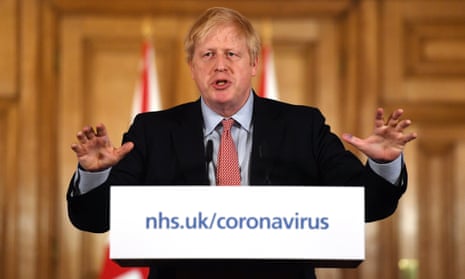The public trusts coronavirus information and advice given by Britain’s leading medical experts far more than statements by politicians, according to an opinion poll on how people are reacting to the pandemic.
While the government is seen, overall, as having handled the crisis well – with 44% approving and 30% disapproving of its reaction – the survey by Opinium for the Observer shows people have more faith in those with medical and scientific knowledge than they have in the nation’s political leaders.
Fewer than two in five (36%) said they trusted what the prime minister, Boris Johnson, said on the subject, while just 37% trusted the information given by the health secretary, Matt Hancock.
However, 59% said they placed their faith in the chief medical adviser to the UK government, Chris Whitty, and 55% said they would trust the director general of the World Health Organization, Dr Tedros Adhanom Ghebreyesus.
The findings suggest that the government has been wise to put Witty and Sir Patrick Vallance, the government’s chief scientific adviser, at the forefront of its public information campaign as it tries to promote awareness and minimise the effects of Covid-19.
Q&AHow can I protect myself and others from the coronavirus outbreak?
Show
The World Health Organization is recommending that people take simple precautions to reduce exposure to and transmission of the coronavirus, for which there is no specific cure or vaccine.
The UN agency advises people to:
- Frequently wash their hands with an alcohol-based hand rub or warm water and soap
- Cover their mouth and nose with a flexed elbow or tissue when sneezing or coughing
- Avoid close contact with anyone who has a fever or cough
- Seek early medical help if they have a fever, cough and difficulty breathing, and share their travel history with healthcare providers
- Advice about face masks varies. Wearing them while out and about may offer some protection against both spreading and catching the virus via coughs and sneezes, but it is not a cast-iron guarantee of protection
Many countries are now enforcing or recommending curfews or lockdowns. Check with your local authorities for up-to-date information about the situation in your area.
In the UK, NHS advice is that anyone with symptoms should stay at home for at least 7 days.
If you live with other people, they should stay at home for at least 14 days, to avoid spreading the infection outside the home.
Seven in 10 people say they have changed aspects of their behaviour in some way since the virus began to spread. About 28% say they have stopped shaking hands, 20% have stopped touching their own faces and 18% have postponed making plans for holidays, while 8% have cancelled holidays already booked.
Despite the fact that the prime minister and medical experts have said washing hands regularly is the most important step people can take, only 53% of those asked said they were doing so more than they usually do. Almost three-quarters of people (73%) said they were now worried about the virus. About 47% of UK adults thought the virus would have a negative effect on their own finances, up from 34% at the start of the week. About 80% thought it would have a negative effect on the national economy.
There is now a widespread belief among the public that the virus will strike them or those close to them. Two in five (42%) think it is likely that they will catch the virus themselves, while 46% think a close family member will catch it. Half (51%) think a colleague will catch it.
The public is very divided when asked if the government has done enough to combat the virus. In London, where the proportion already struck by the virus is highest, people are most likely to say the authorities have not done enough. Across the country as a whole, about 41% think the government’s response has been proportionate, against 40% who say it has “underreacted”. But in London, only 32% think its reaction has been proportionate, with 55% saying it has not done enough.
The public also appears to be reconciled to the idea that more drastic measures will need to be taken soon. About 76% think flights from virus hotspots will need to be banned, and 68% think handwash and toilet paper will need to be rationed. About 44% think schools will need to be closed, against 26% who think this would be unnecessary.
Adam Drummond of Opinium said that while more people approved of the government’s response than had a negative view of it, public opinion could switch if the situation worsened dramatically.
“The fact that only 42% believe that they will contract coronavirus while the government’s strategy assumes that a significantly higher proportion will become infected means there is the risk of a nasty shock for a substantial slice of the electorate,” he said.
Opinium interviewed 2,005 UK adults between Thursday and Friday.
